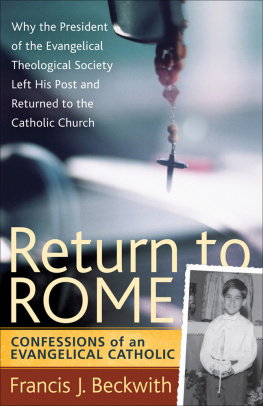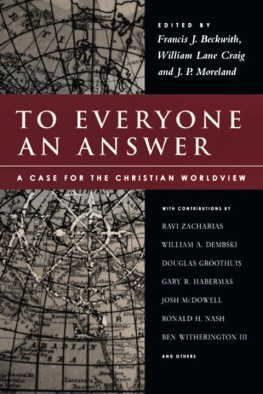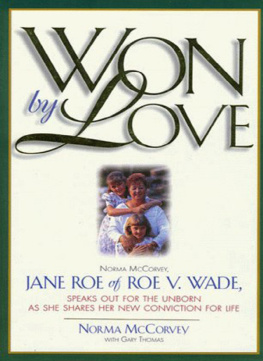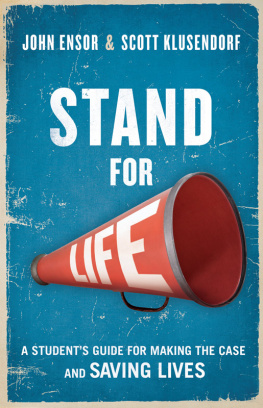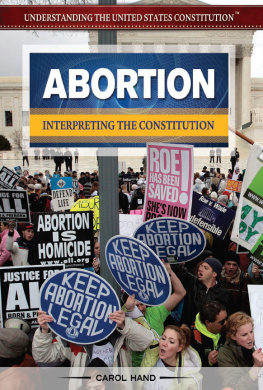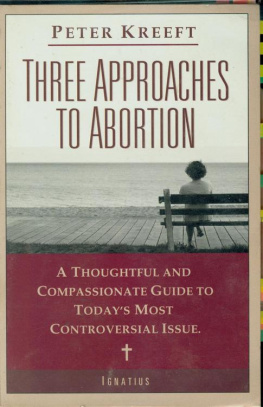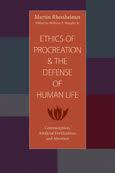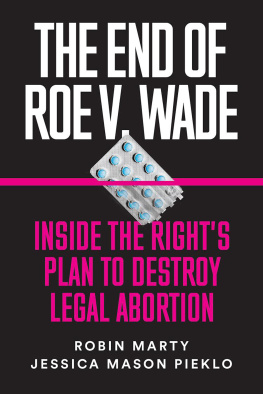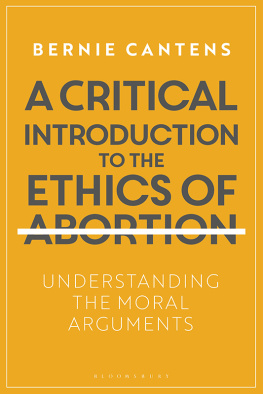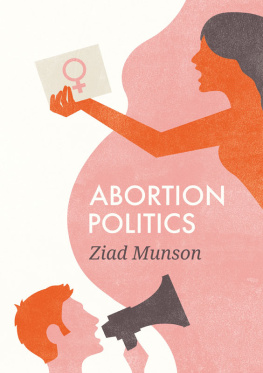Defending Life
Defending Life is arguably the most comprehensive defense of the pro-life position on abortion morally, legally, and politically that has ever been published in an academic monograph. It offers a detailed and critical analysis of Roe v. Wade and Casey v. Planned Parenthood as well as arguments by those who defend a Rawlsian case for abortion choice, such as J. J. Thomson. The author defends the substance view of persons as the view with the most explanatory power. The substance view entails that the unborn is a subject of moral rights from conception. While defending this view, the author responds to the arguments of thinkers such as Boonin, Dworkin, Stretton, Ford, and Brody. He also critiques Thomsons famous violinist argument and its revisions by Boonin and McDonagh. Defending Life includes chapters critiquing arguments found in popular politics and the controversy over cloning and stem cell research.
Francis J. Beckwith is associate professor of philosophy and jurisprudence, Baylor University. He teaches in the departments of philosophy and political science as well as the J. M. Dawson Institute of Church-State Studies, where he served as associate director from 2003 until 2007. A 20022003 Madison Research Fellow in the politics department at Princeton University, he is a graduate of Fordham University (Ph.D., philosophy) and the Washington University School of Law, St. Louis (M.J.S.), where he won the CALI Award for academic work in the Reproductive Control Seminar. His more than a dozen books include Is Statecraft Soulcraft? Christianity and Politics (2008); To Everyone an Answer: A Case for the Christian Worldview (2004); Law, Darwinism, and Public Education: The Establishment and the Challenge of Intelligent Design (2003); Do the Right Thing: Readings in Applied Ethics and Social Philosophy , Second Edition (2002); and The New Mormon Challenge: Responding to the Latest Defenses of a Fast-Growing Movement (2002), which was a finalist for the Gold Medallion Award in theology and doctrine. With interests in jurisprudence, politics, philosophy of religion, and public policy, Professor Beckwith has published in a wide variety of academic journals including the Harvard Journal of Law and Public Policy , Journal of Social Philosophy , International Philosophical Quarterly , Hastings Constitutional Law Quarterly , Journal of Medicine and Philosophy , American Journal of Jurisprudence , Journal of Medical Ethics , Public Affairs Quarterly , Notre Dame Journal of Law , Ethics and Public Policy , Social Theory and Practice , Southern Baptist Journal of Theology , Christian Bioethics , Nevada Law Journal , Journal of Law and Religion , and Philosophia Christi . His Web site is http://www.francisbeckwith.com.
CAMBRIDGE UNIVERSITY PRESS
Cambridge, New York, Melbourne, Madrid, Cape Town, Singapore, So Paulo, Delhi
Cambridge University Press
32 Avenue of the Americas, New York, NY 10013-2473, USA
www.cambridge.org
Information on this title: www.cambridge.org/9780521870849
Francis J. Beckwith 2007
This publication is in copyright. Subject to statutory exception and to the provisions of relevant collective licensing agreements, no reproduction of any part may take place without the written permission of Cambridge University Press.
First published 2007
Printed in the United States of America
A catalog record for this publication is available from the British Library.
Library of Congress Cataloging in Publication Data
Beckwith, Francis
Defending life : a moral and legal case against abortion choice / Francis J. Beckwith.
p. cm.
Includes bibliographical references and index.
ISBN 978-0-521-87084-9 (hardback) ISBN 978-0-521-69135-2 (pbk.)
1. Abortion. 2. Abortion Moral and ethical aspects. I. Title.
HQ767.B427 2007
363.46dc22 2006101329
ISBN 978-0-521-87084-9 hardback
ISBN 978-0-521-69135-2 paperback
Cambridge University Press has no responsibility for the persistence or accuracy of URLs for external or third-party Internet Web sites referred to in this publication and does not guarantee that any content on such Web sites is, or will remain, accurate or appropriate.
ACKNOWLEDGMENTS
I would like to thank the James Madison Program in American Ideals and Institutions (Department of Politics, Princeton University) and its director Robert P. George (McCormick Professor of Jurisprudence, Princeton) for providing me with a research fellowship in an idyllic environment with brilliant colleagues and a proficient staff so that I was able to work on this book free of my ordinary responsibilities as a faculty member. Although the bulk of my work was completed at Princeton (20022003), it was at Baylor University, in the 20032006 school years, that I finished the books final chapters and prepared the manuscript and its edited legacies for the publisher. For this reason, I would like to single out for special thanks several of my graduate assistants who were assigned to me by the chair of the Department of Church-State Studies, the academic unit at Baylor University in which I held my faculty appointment during the writing and production of this book. My three 20032004 graduate assistants T. Hunter Baker, Jennifer Clary, and Matthew Tapie were especially helpful with proofreading an earlier version of the manuscript as well as offering their suggestions and insights. Hunter compiled the books selected bibliography. After Cambridge University Press accepted the manuscript for publication, another one of my graduate assistants, John Lee (20042006), performed the task of reading a later incarnation of the manuscript. Two other graduate assistants, Gerard Figurelli (20052007) and Jeremiah Russell (20052006), proofread earlier versions of portions of the book that had appeared in a variety of academic journals. In Spring 2007 Gerard took on the tasks of producing an index for the book as well as reviewing the copyedited version of the manuscript. He excelled in both tasks, exceeding even my high expectations of him.
Many colleagues and friends, as well as scholars and writers whom I admire from a distance, have helped sharpen and shape the arguments I present and assess in this book in either my conversations with them or while I was immersing myself in their published works. Among these wise souls are a select few whose insights stand out as particularly illuminating: Robert P. George, Hadley Arkes, Michael Bauman, J. P. Moreland, Scott B. Rae, Gregory P. Koukl, John Conley, Teresa Collett, Peter Kreeft, Patrick Lee, Diane Nutwell Irving, W. Norris Clarke, Keith Pavlischek, Seana Sugrue, Jim Stoner, Frederica Matthews-Green, John Finnis, Alexander Pruss, Joe Koterski, Doris Gordon, Edwin C. Hui (Xu Zhi-Wei), David Reardon, Robert Passantino, Gretchen Passantino, Steve Schwarz, Frank Pavone, Marvin Olasky, Steven D. Thomas, Don Marquis, Tom King, Jorge Garcia, Nigel Cameron, A. A. Howsepian, Norm Geisler, Richard Stith, Scott Klusendorf, J. Budziszewski, Leon Kass, Harold O. J. Brown, Mark Foreman, Ronald Tacelli, and Francis Canavan.
Other scholars and writers those who oppose the position (or aspects of the position) I defend in this book have forced me, with their philosophical ingenuity and careful analysis, to hone my arguments and clarify their premises: Dean Stretton, David Boonin, Kenneth Himma, Frances Kamm, Eileen McDonagh, James Sadowsky, Craig Walton, Ronald Wilburn, Mark Michael, Tris Englehardt, Louis P. Pojman, Peter Singer, Michael Tooley, Laurence Tribe, Robert Baird, Susan Appleton, Jeffrey Stout, Ronald Dworkin, Judith Jarvis Thomson, Robert Wennberg, John Rawls, Stuart Rosenbaum, and Paul Simmons. Without these noble adversaries, my task would have been far less challenging and thus far from complete.


